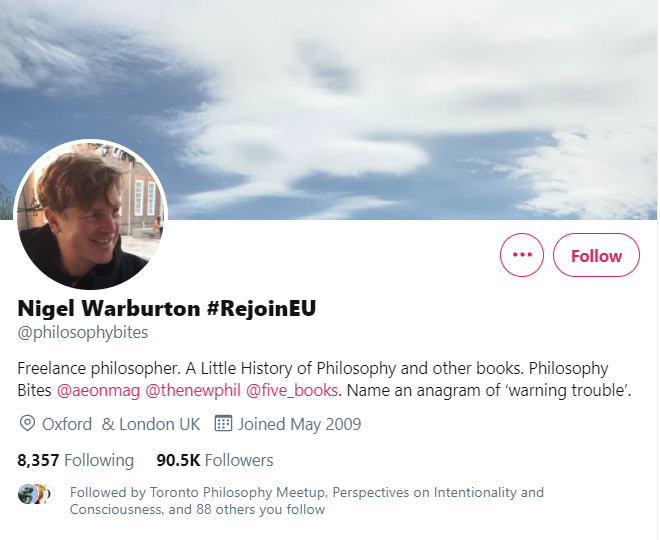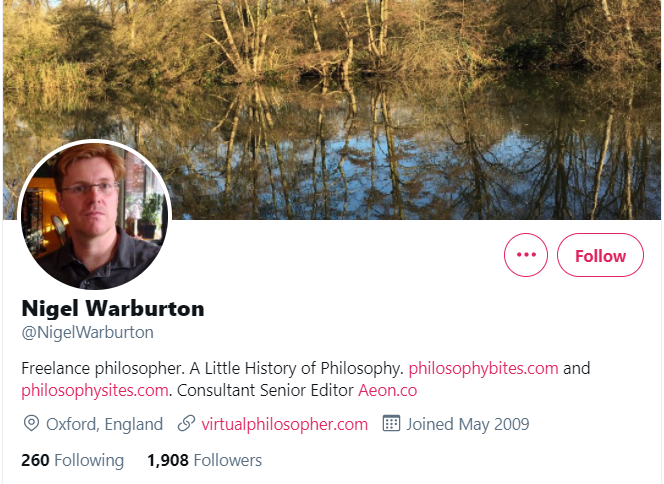The British philosopher Nigel Warburton is well known as a writer of what’s often called “popular philosophy”. He’s written various introductory books on philosophy, including the bestselling Philosophy: The Basics. He runs a philosophy weblog Virtual Philosopher and podcasts interviews with established philosophers at Philosophy Bites. He’s also written for the Guardian newspaper.
The “Classical Conception” of a Philosopher?
Nigel Warburton approvingly states what he believes is the “classical conception” of a philosopher. He puts it this way:
“The classical conception of a philosopher is someone who thinks about their own life, as well as about the nature of life.”
Warburton then contrasts that conception with what he believes many (or even most) academic analytic philosophers do. He continues:
“You wonder about the competence of some people who, having thought about their own lives, have decided to devote them entirely to making a mediocre contribution to an obscure debate. It’s like deciding to spend your life solving crossword puzzles.”
Perhaps one can see why Nigel Warburton doesn’t have much time for academic philosophers because… well, he’s written a lot of popular philosophy… Yet Warburton himself has a strong and long academic background.
At first Warburton was a pupil at the fee-paying Sevenoaks School; which is one of the United Kingdom’s most expensive schools. He then gained a BA from the University of Bristol and a PhD from the University of Cambridge. More relevantly and perhaps ironically, Warburton was a lecturer at the University of Nottingham and later joined the Department of Philosophy at the Open University.
So, like so many members of the elite and so many academics, Warburton has a go at elitists and academics (i.e., for being academics, not for other things). Indeed Warburton himself recognised this when he said that he was once in an
“awkward position as a lecturer because I didn’t feel completely committed to the academic world of philosophy”.
Warburton was a professional academic from before 1994 until 2013 and a student of philosophy before that. Indeed it’s highly likely that publishers wouldn’t have been interested in Warburton’s popular philosophy if it weren’t for the fact that he’d previously gained a PhD from Cambridge University and also been an academic.
Fake Philosophers
Warburton hints at specialisation and academic philosophy. That is, he wonders why academic analytic philosophers “have decided to devote them entirely to making a mediocre contribution to an obscure debate”. What’s more, he believes that this is “like deciding to spend your life solving crossword puzzles”.
Warburton is also prepared to defend his position. He said elsewhere:
“I’d be happy to have a debate with someone who thinks that, who does what I call ‘crossword puzzle philosophy’, just footnotes to footnotes. Is that real philosophy? Is that what Socrates did? Is that what Hume did? I don’t think so.”
There’s more from Warburton on academic analytic philosophers here:
“A lot of professional philosophers lack the imagination required to think about what it’s like not to understand something. Some have got into a complacent habit of speaking to each other in a kind of technical language, which is almost at times the avoidance of doing philosophy. They’re part of a culture of people who always say the same things and make the same moves: just making finer and finer discriminations between whether they’re a particular kind of materialist or a particular kind of functionalist. People stake out little claims. When faced with the need to explain what they’re doing and why it should be of interest to anyone at all outside of that culture, many flounder.”
I agree with much of that. However, I don’t believe that Warburton’s vision of political-activist philosophy (see later) is a better alternative. Indeed isn’t that exactly what we have with much continental philosophy?
I used the words “academic analytic philosophers” above because it’s clear that such people are Warburton’s prime — or even only — target. That can be seen from what else he has to say on this matter. Yet Warburton must also realise that most well-known continental philosophers (even the “relevant” and politically-active ones) made their name as academics too.
Warburton has some more critical things to say about academic analytic philosophers. He classes (in scare quotes) “the best philosophers” as those who’ve “passed all the exams”. He then adds that they (i.e., other academics) believe these philosophers are the “best philosophers [because] their peers say they’re the best philosophers”.
Warburton then gets all essentialist (or purist) about philosophy by asking this question:
“Are they really in the spirit of philosophy when they do this?”
So what is “the spirit of philosophy”?
Was the spirit of philosophy the same in 5th century BC Greece as it was when Francis Bacon was writing in the 17th century? What about 18th-century philosophy compared to the philosophy written in the 1930s when the logical positivists were in their heyday? And do the writers of popular philosophy automatically capture the spirit of philosophy when they attempt to make sure that their philosophy is (as it’s often put) “relevant”?
Specialisms
All academic disciplines have their specialists and specialisms.
This means that everything Warburton has just said about philosophers can also be said about most anthropologists, economists, historians, psychologists, sociologists, literary theorists, etc. Indeed many of the academics of some of these disciplines are far worse offenders than academic philosophers.
For example, haven’t sociologists, political theorists, literary theorists, etc. “got into a complacent habit of speaking to each other in a kind of technical language”. Aren’t they “part of a culture of people who always say the same things and make the same moves”? Finally, aren’t the following words from Warburton also perfectly applicable to many — or even most - other academics (i.e., those academics outside analytic philosophy)? -
“When faced with the need to explain what they’re doing and why it should be of interest to anyone at all outside of that culture, many flounder.”
In addition to all that, many poets, novelists, composers, etc. have made (to use Warburton’s words) “mediocre contribution[s]” to their disciplines too.
So philosophy isn’t like mastering the game of Monopoly or taking up amateur gardening. But even here I must hold my horses and say that some non-academic philosophers have also written highly complex and detailed philosophy. That is, philosophy that certainly wasn’t either about (to use Warburton’s words) “their own life” or about “the nature of life”. In other words, their not being academics didn’t stop them from writing about, for example, causation (as with Aristotle) or “hyperbolic doubt” (as with Descartes).
I quoted Warburton’s use of the words “mediocre contribution to an obscure debate” earlier. So here it must be asked if Warburton means either of the following two things:
(1) That the content of much (or all) academic analytic philosophy is mediocre.
Or,
(2) That the impact of the philosophical content is (or has been) mediocre.
First things first: many great philosophical works in history had — at least initially — a mediocre impact. What’s more, who’s going to decide if the content is mediocre anyway? Indeed is the content definitionally mediocre precisely because it has (or had) a mediocre impact on society at large?
Relevance
The ironic thing is that Warburton seems to argue against relevance in philosophy. Or, more accurately, he’s against the Government — and institutions and academics working on its behalf — “measuring” the relevance of academic philosophers’ works.
Specifically in reference to the Research Excellence Framework (REF), Warburton said:
“One of the most disturbing things about academic philosophy today is the way that so many supposed gadflies and rebels in philosophy have just rolled over in the face of the REF — particularly by going along with the idea of measuring and quantifying impact, a technical notion which was constructed for completely different disciplines. I’m not even sure what research means in philosophy. Philosophers are struggling to find ways of describing what they do as having impact as defined by people who don’t seem to appreciate what sort of things they do. This is absurd.”
He continued:
“Just by entering into this you’ve compromised yourself as a philosopher. It’s not the kind of thing that Socrates did or that Hume did or that John Locke did… Why are you doing this? I’m getting out. For those of you left in, how can you call yourselves philosophers? This isn’t what philosophy’s about.”
So perhaps Warburton is (or was) against the government and its representatives calling the shots when it comes to academic philosophers’ work. (This has been called “government interference”.) As it is, he nonetheless seems to be keen on political — and even party-political — commitment. That said, this isn’t my subject and it’s probably advisable not to tread on a subject that will be very dear to academics’ hearts.
Real Philosophers

So what do Nigel Warburton’s words “classical conception of a philosopher” actually mean?
I ask that because, even since the ancient Greeks, it’s been the case that not all philosophers wrote exclusively about their own lives and/or the nature of life.
Surely Warburton should have said the following instead:
The average layperson’s conception of a philosopher is someone who thinks about their own life; as well as about the nature of life.
Warburton makes it fairly clear (in various places) what he believes real philosophers do and what real philosophy is.
For example, in an interview he stated the following points:
“Philosophers are very well-placed to be critical participants about the nature of the democracy they’re living in, but very few respond to contemporary events. For instance today the big discussion is about gay marriage. It’s being discussed in Parliament.”
Warburton then goes on to tell us about fake philosophers and what they do. He continued:
“Philosophers today have mostly got their heads down. They’re concerned with writing for a journal which will publish work that takes them two or three years, and only five people will read it. These are people who could be contributing to something that’s incredibly important. Gay marriage is just one example of many. I don’t think philosophers responded particularly well to 9/11… philosophers are by and large more interested in getting a paper in Mind or Analysis than they are in commenting on the major political events of our time.”
The fact is that countless sociologists, economists, psychologists, political theorists, political writers, etc. are producing a vast amount of work on precisely the same kind of subjects Warburton mentions — as do continental philosophers! So does Warburton really want philosophical work on these subjects? Perhaps he’d also find purely philosophical work (or analysis) equally dull, boring and (to use his own words) “rather dry” precisely because it still isn’t (as the phrase has it) “politically committed” . As we’ll see, Warburton is politically committed (in a strident and obvious way) and he seems to demand political commitment from other philosophers too.

I say all that because after taking note of Warburton’s Twitter account, I soon noted that he uses his profile as a vehicle for crude and tribal political activism. More accurately, over the weeks I saw almost zero philosophical tweets or even political tweets with philosophical content. Instead, all Warburton seemed to tweet was crude and politically-tribal stuff. (It’s worth noting here that Warburton isn’t anywhere near as politically Manichean, zealous and extreme as Professor Ray Monk — see here. There are a number of other analytic philosophers on Twitter in Monk’s mould too.) Thus Warburton seemed to be no different from the countless other political activists on Twitter. Again, there was no philosophy there; though there was plenty of politics…

And then I realised that Warburton has two different Twitter accounts. He uses one account for the mainly political stuff (see here) and the other one for purely philosophical stuff (see here and the screenshots above and below). Yet that very neat-and-tidy division seems to work against Warburton’s general position on philosophy. If Warburton demands that philosophy be relevant when it comes to politics, and he also believes that philosophy can be very useful when it comes to political issues, then why has he completely separated philosophy from politics and created two distinct Twitter accounts? Again, Warburton’s politics account on Twitter contains no philosophical analysis at all; although it does contain various tweets about philosophy.
Of course Warburton will probably say something like this:
It’s only Twitter. What do you expect? Long-winded philosophical expositions?
… Well, some people on Twitter do advance cogent, if short, arguments — sometimes over a couple of tweets. (For example, Richard Dawkins, Stephen Fry, Julian Baggini, etc.) And that certainly doesn’t also mean that I agree with them either.

So Warburton has two sets of followers on Twitter. One group follows him because it likes his crude and politically-tribal tweets. And the other group is interested in the philosophical issues Warburton covers in his other Twitter account. Again, doesn’t this neat division work against what Warburton is claiming to do? In other words, why doesn’t Warburton use his knowledge and philosophical skills when he posts his political tweets? Does Warburton really need to be so crude and politically tribal — even on Twitter? Is that what being relevant is all about?
***********************************













No comments:
Post a Comment